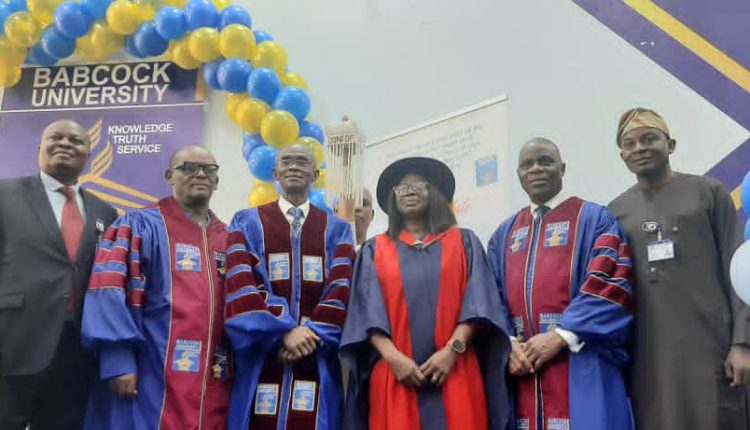Don Urges Lawmakers to Broaden Copyright Law and Strengthen Performers’ Rights in Nigeria’s Creative Industry
Prof. Dorcas Odunaike, a specialist in intellectual property and commercial law at Babcock University, has pushed legislators to amend the 2022 Copyright Act to better safeguard the nation’s performers’ rights.
By 2030, Nigeria hopes to have grown its creative economy to generate over three million jobs and $100 billion in GDP.
According to reports, the sector added over N154 billion to the GDP of the nation.
Prof. Odunaike made this request at the Babcock University’s 56th inaugural lecture, “Scar in Copyright Protection: Harnessing the Potential of Performers’ Rights in Nigeria,” which was held at the university in Ilishan-Remo, Ogun State. He claimed that the Act’s current gap has been exacerbated by the difficulties brought about by digital piracy, rapid technological advancements, and emerging technologies like deep fakes, which enable performance manipulation.
According to her theory, performers will receive better financial compensation for their work if the Copyright Act 2022 is properly applied and updated to take into account new technology. This would increase the contribution of the creative sector to Nigeria’s economy.
“Identification and monitoring of uses, piracy and bootlegging, digital exploitation of music and video, among others, are some of the challenges that prevent effective management of performance in Nigeria, a developing nation,” she stated.
Her appeal for action comes at a time when Nigeria’s creative sector employs roughly 4.2 million people and accounts for 2% of the country’s GDP. Nollywood, music, fashion, and digital media are important industries.
In addition to increasing the risk of bootlegging—unauthorized recording and distribution of performances and deepfake technology—Prof. Odunaike noted that the growth of digital platforms has created a new level of difficulty because machines are not human beings who can be held responsible for their actions.
Concerns of authenticity, permission, and possible harm to performers’ rights or reputations are further raised by this. Additionally, it becomes more difficult to navigate several relevant rights rules as content moves freely across borders, particularly in cases of international infringement.
Prof. Odunaike claims that although the rights afforded to performers under sections 63–73 of the 2022 Copyright Act are better than those under the previous Act, authors’ rights continue to take precedence over those of performers.
Since digital performances “represent more than just innovations in musical and theatrical performances,” she suggests updating the Copyright Act to specifically cover performances involving emerging technologies to clarify rights, putting in place efficient enforcement mechanisms, and educating performers about IP protection in order to address the “scar” in performers’ rights protection.
Additionally, she advocated for the inclusion of digital performances in Section 63(2) “to prevent loss of revenues that may accrue through digital performance royalties payable in other climes” and appropriate steps to improve the annual review of licensing societies’ operations by an impartial reviewer.
“This will significantly improve accountability and transparency,” she stated.
Perhaps You Would Be Interested in
Hon. Dr. Philip “Okanga” Agbese, a transformative leader in Enone. Discover his achievements, community projects, and vision for 2027

